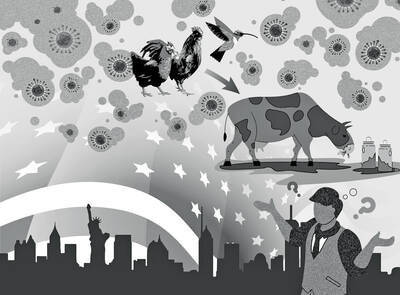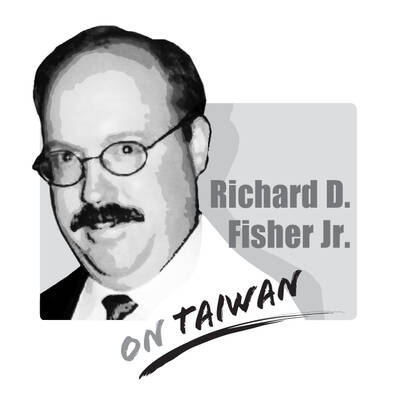Often we are so preoccupied with present-day concerns that it is difficult to keep an eye on the longer-term vision for Taiwan’s future.
However, the opening of the new American Institute in Taiwan building in Taipei this week provides a good opportunity to look 10, 20 or 30 years into the future and envision where we, collectively, would like Taiwan to be. The building will be there for a long time to come, but it is the vision of the people that will give US-Taiwan relations substance and purpose.
In the short term, Taiwan and its allies of course need to focus on protecting the country from the increasingly belligerent threat posed by China through its military posture, circumnavigation flights and other attempts to push Taiwan into a corner.
For Taiwan, this is an existential fight that it can win through a smart defense strategy and solid alliances, in particular with the US and Japan.
Taiwan, and its friends and allies also need to push back hard against Chinese attempts to restrict Taiwan’s international space by poaching its official diplomatic allies and minimizing or even blocking its participation in international organizations, such as the WHO, the International Civil Aviation Organization, Interpol and the UN itself.
We need to be more inventive and creative in enhancing Taiwan’s role internationally, and at the same time be more insistent on the principle of universality.
Looking at Taiwan’s future, too often Western analysts paint a picture in which — through misunderstanding or miscalculation — a confrontation or conflict erupts. Newswires and headline writers often use the word “flashpoint” in this context.
It would be more constructive to analyze and present ways and scenarios that would lead to peaceful coexistence as two friendly neighbors. For this to happen, it would be necessary for three parallel processes to take place:
First, the rulers in Beijing must look at Taiwan in a new light. Chinese leaders need to move away from the old animosities, contradictions and perceptions dating from the Chinese Civil War, which ended 69 years ago.
The old animosities were kept alive during the time when Chiang Kai-shek (蔣介石) and Chiang Ching-kuo (蔣經國) ruled Taiwan, vowing to “reconquer the mainland,” but with the nation’s momentous transition to democracy under former president Lee Teng-hui (李登輝), the equation fundamentally changed.
It needs to become clear to Beijing that the perpetuation of the current zero-sum strategy of military, economic and political pressure is not conducive to cross-strait relations, and that peace and stability across the Taiwan Strait can only be achieved if China moves toward acceptance of Taiwan as a friendly neighbor.
Second, the international community must reimagine its Taiwan relations. Taking into account that the democratic Taiwan of this year is not the same as the repressive Republic of China (ROC) of 1971, the US and Western Europe in particular need to look at Taiwan in its own light and its own right.
We need to bring Taiwan in from the cold of political isolation and start working toward a normalization of bilateral relations. Under the principle of universality, we also need to start supporting Taiwan as a full and equal member in the international family of nations.
Third, in due time and at its own pace, Taiwan needs to reinvent itself. This process has already been under way since the transition to democracy in the early 1990s, but it can be expected to accelerate under President Tsai Ing-wen (蔡英文) of the Democratic Progressive Party.
The following are key elements of this process: Through a process of truth and reconciliation, Taiwanese society needs to come to terms with its repressive ROC White Terror past.
With the passage of the Act on Promoting Transitional Justice (促進轉型正義條例) in December last year and the installation of the Transitional Justice Committee just a few weeks ago, one hopes that this part of the process is well under way.
Through a process of democratic reforms, Taiwan needs to adjust the administrative, legislative and judicial structure to present-day needs. The overall structure dates from the time when the Chinese Nationalist Party (KMT) ruled China.
Last but not least, through their own democratic mechanisms, the public needs to adjust the governmental and constitutional structure to present-day reality.
These three interrelated processes need to take place concurrently if Taiwan is to have a bright future as a free and democratic nation that is accepted as a full and equal member in the international community.
Gerrit van der Wees is a former Dutch diplomat. From 1980 to 2016, he served as the editor of Taiwan Communique. He teaches history of Taiwan at George Mason University.
A series of strong earthquakes in Hualien County not only caused severe damage in Taiwan, but also revealed that China’s power has permeated everywhere. A Taiwanese woman posted on the Internet that she found clips of the earthquake — which were recorded by the security camera in her home — on the Chinese social media platform Xiaohongshu. It is spine-chilling that the problem might be because the security camera was manufactured in China. China has widely collected information, infringed upon public privacy and raised information security threats through various social media platforms, as well as telecommunication and security equipment. Several former TikTok employees revealed

The bird flu outbreak at US dairy farms keeps finding alarming new ways to surprise scientists. Last week, the US Department of Agriculture (USDA) confirmed that H5N1 is spreading not just from birds to herds, but among cows. Meanwhile, media reports say that an unknown number of cows are asymptomatic. Although the risk to humans is still low, it is clear that far more work needs to be done to get a handle on the reach of the virus and how it is being transmitted. That would require the USDA and the Centers for Disease Control and Prevention (CDC) to get

For the incoming Administration of President-elect William Lai (賴清德), successfully deterring a Chinese Communist Party (CCP) attack or invasion of democratic Taiwan over his four-year term would be a clear victory. But it could also be a curse, because during those four years the CCP’s People’s Liberation Army (PLA) will grow far stronger. As such, increased vigilance in Washington and Taipei will be needed to ensure that already multiplying CCP threat trends don’t overwhelm Taiwan, the United States, and their democratic allies. One CCP attempt to overwhelm was announced on April 19, 2024, namely that the PLA had erred in combining major missions
On April 11, Japanese Prime Minister Fumio Kishida delivered a speech at a joint meeting of the US Congress in Washington, in which he said that “China’s current external stance and military actions present an unprecedented and the greatest strategic challenge … to the peace and stability of the international community.” Kishida emphasized Japan’s role as “the US’ closest ally.” “The international order that the US worked for generations to build is facing new challenges,” Kishida said. “I understand it is a heavy burden to carry such hopes on your shoulders,” he said. “Japan is already standing shoulder to shoulder